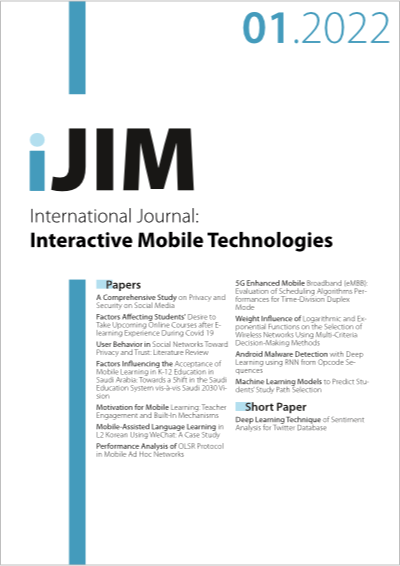5G Enhanced Mobile Broadband (eMBB): Evaluation of Scheduling Algorithms Performances for Time-Division Duplex Mode
DOI:
https://doi.org/10.3991/ijim.v16i01.25941Keywords:
Time Division Duplex, scheduling, throughput, radio resource allocation, 5G NRAbstract
5G mobile communications introduce novel solutions to overcome the frequency spectrum’s shortage. It broadens the spectrum band to millimeter-waves, employs multiple numerologies to calculate subcarrier spacing, and supports various division duplex modes. Furthermore, the fifth generation of mobile networks intends to employ both, frequency division duplex, and time division duplex. This study focuses on Time Division Duplex (TDD) mode. Compared to the Frequency Division Duplex (FDD), the time duplex mode enhances flexibility and allows efficient frequency spectrum usage. However, the recent papers addressing resource scheduling issues for TDD duplex employ only the current classical schedulers, which were primarily designed for FDD mode, to accomplish radio resource allocation. In this paper, we compared the achievable throughput and data accumulated in the buffer of these schedulers to assess their suitability and compatibility with TDD specifications. The resulting performances show that an appropriate scheduler in line with TDD requirements should be implemented to exploit the available spectrum efficiently and reach the required throughput.
Downloads
Published
2022-01-18
How to Cite
Mamane, A., Fattah, M., El Ghazi, M., & El Bekkali, M. (2022). 5G Enhanced Mobile Broadband (eMBB): Evaluation of Scheduling Algorithms Performances for Time-Division Duplex Mode. International Journal of Interactive Mobile Technologies (iJIM), 16(01), pp. 120–131. https://doi.org/10.3991/ijim.v16i01.25941
Issue
Section
Papers
License
Copyright (c) 2021 Asmae MAMANE, Mohammed Fattah, Mohammed El Ghazi, Moulhime El Bekkali

This work is licensed under a Creative Commons Attribution 4.0 International License.



